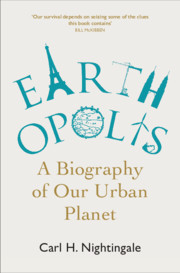
- Cited by 4
-
Cited byCrossref Citations
This Book has been cited by the following publications. This list is generated based on data provided by Crossref.
Vale, Lawrence J. 2022. Gordon Cherry memorial lecture 2022: the design-politics of planning equitably resilient capital cities. Planning Perspectives, Vol. 37, Issue. 6, p. 1269.
Spivey, Brian 2023. The Anthropocene and a Small Place in China. Journal of Urban History,
Dantas, Mariana and Hart, Emma 2024. Early Modern Atlantic Cities.
Lees, Lynn Hollen 2024. Making the global turn matter: strategies and pathways. Urban History, p. 1.
- Publisher:
- Cambridge University Press
- Online publication date:
- May 2022
- Print publication year:
- 2022
- Online ISBN:
- 9781108339353




